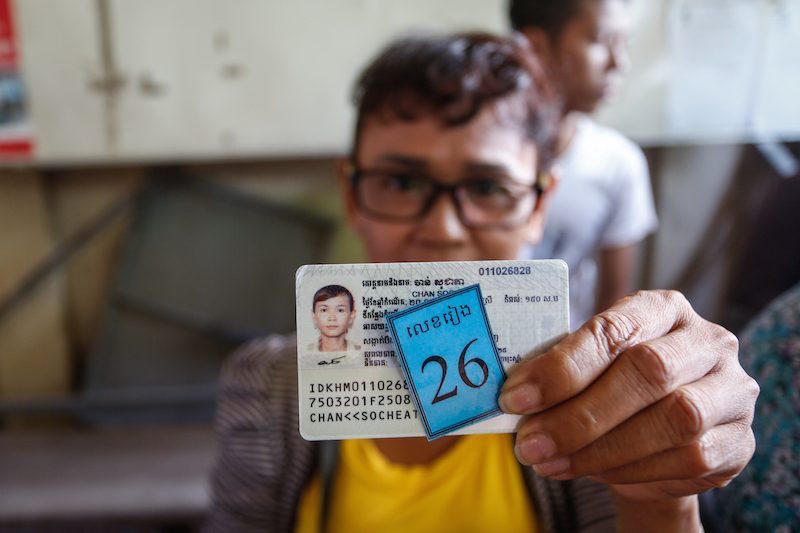About 2 million eligible Cambodian voters won’t be registered to cast ballots in next year’s commune election. And while many observers find the situation unsatisfactory—even undemocratic—they agree that there is no easy fix.
—News Analysis—
With exactly a week left to register to vote in the local elections to be held in the middle of next year, the National Election Committee (NEC) reported almost 7.4 million citizens registered through Sunday out of 9.7 million eligible voters—leaving 2.3 million unregistered.

And although Prime Minister Hun Sen has been sure to remind people to register to vote during his recent public speeches, it is his own government’s policy that has left almost a quarter of the electorate disenfranchised.
With the number of daily registrations having slowed to a relative trickle, monitors across the country say that most people who can register already have. The remaining 2 million, both ruling and opposition party officials have said, are likely made up mostly of migrant workers living outside Cambodia.
Under the country’s election laws, those workers must return to their home communes during the registration period in order to sign on to new computerized voter rolls. This is impractical for most, and means that a major segment of working-age adults will not have their voices heard at the ballot box.
“Everybody deserves a right to vote wherever they are,” said Ichal Supriadi, the executive director of the Asian Network for Free Elections (Anfrel), a regional election monitoring organization.
“More and more countries are starting to enfranchise their citizens living abroad,” Mr. Supriadi said, adding that those countries that continued to leave them out were depriving their citizens of their rights.
“They’re disenfranchising their diaspora,” he said.
However, allowing citizens to vote from abroad has been a struggle for other countries across the region, he said.
While countries like Indonesia, Malaysia and Timor-Leste were moving toward partial solutions, others, like Burma and India, could barely even track their citizens migrating overseas, let alone find a way for them to cast ballots.
Meredith Weiss, professor of political science at the State University of New York at Albany, said the record for overseas voting was mixed even among Southeast Asia’s more advanced democracies.
“Malaysia did make it a bit easier for citizens overseas (except in neighboring countries) to vote as of the last election, but it was still a hassle—so even with a fairly enthusiastic response, those votes made fairly minimal impact,” she said in an email.
In Indonesia, “all overseas votes count for one district in Jakarta, so they matter there, but nowhere else.”
One exception may be the Philippines. Ramon Casiple, executive director of the Philippines’ Institute for Political and Electoral Reform, said the country’s president, Rodrigo Duterte, had mobilized the overseas vote to victory in this year’s elections.
“The potential number of voters are huge—6 to 7 million compared to 56 million total voters in the homefront. Their family members in the country who may vote are about twice this,” Mr. Casiple wrote in an email.
Overseas workers had huge sway over their families back home thanks to sending regular remittances, he explained.
“If organized, they are a major factor in Philippine local elections and even national elections. President Duterte harnessed this potential in the last May 2016 election and [overseas Filipino workers] on social media was a major support base for his victory.”
Mr. Casiple said the Cambodian situation—having no provisions to help overseas workers vote—was “definitely” unsatisfactory, though he admitted any solution would offer plenty of complications.
Overseas voting could be used to rig elections, while local laws in foreign countries frequently got in the way of voting and campaigning. In Saudi Arabia, for example, “you need permission [usually denied] for election activities outside embassies and consulate,” he said.
Anfrel’s Mr. Supriadi agreed, saying that the monitoring of overseas votes was the most important component of potential reform, adding that logistics could also be extremely challenging for election officials.
Moreover, he said, reform in Cambodia was a matter of “political will” because the country’s election rules were written into parliamentary laws.
“That’s the role of the international and national civil society groups, to try to open the minds of the ruling party,” Mr. Supriadi said.
The likelihood of the ruling CPP shifting course on the issue of migrants voting from abroad seems slim, however, as the government has dismissed even the most modest proposals on the issue, such as setting up extra voting stations along the border with Thailand.
Opposition leader Sam Rainsy said the prospect of enfranchising migrant workers was “a disaster for the CPP who must be scared to death.”
“The CPP-led government knows that the vast majority of migrant workers do not like them because, starting with the first reason, they could not find jobs in Cambodia and had to migrate in often painful conditions,” Mr. Rainsy said in an email.
“As for the another one million Cambodians permanently living overseas, they see how democracy and prosperity go together, which is the opposite of the CPP system in Cambodia where authoritarianism and poverty go hand in hand,” he said.
“Once you have known freedom you are not willing to give it up, you are even ready to fight for it.”
CPP spokesman Sok Eysan, when asked if the government would be doing more to enfranchise overseas voters, said the priority was following the current law and making sure there were no accusations of irregularities in registrations.
“For the new voters lists, we need to be careful in making it as we need to have transparency and accountability to avoid being accused,” he said. “For example, some people used to accuse us of the cheating of more than 1 million voters.”
“So we also want to have migrant workers to come back to register and vote,” Mr. Eysan said. “But we need to do so in accordance with the law.”